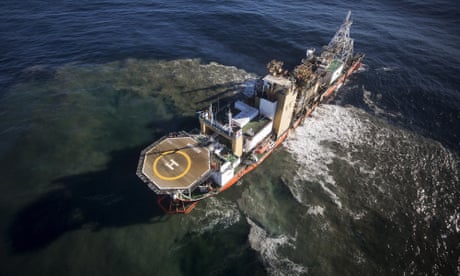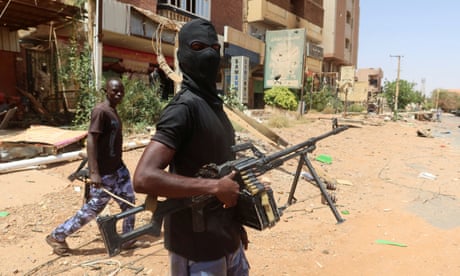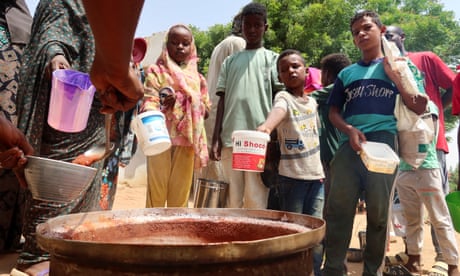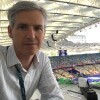It’s often assumed that Islamophobia is the driving force behind US anti-Palestinian bigotry. In fact, it’s the other way around
Moustafa Bayoumi
with illustrations by Mona Chalabi
THE GUARDIAN
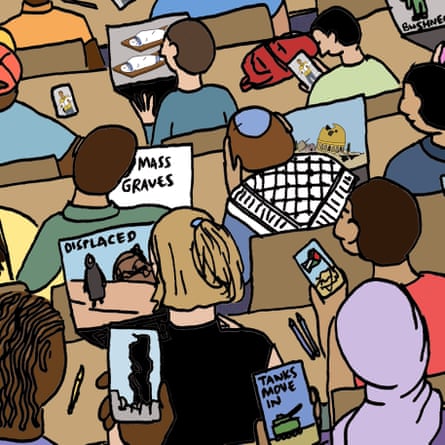
We hear a lot of talk these days about Islamophobia, anti-Arab racism, and anti-Palestinian bigotry, usually in that order. But which actually came first?
In the United States, Islamophobia is commonly seen as the motor that drives anti-Arab racism, a subset of which is anti-Palestinian bigotry. And yet, American history doesn’t quite abide by this order. In fact, it’s the opposite.
In US history, anti-Palestinian bigotry, expressed primarily through repressive practices of the US government, almost always came first. This anti-Palestinianism then manifested into a generalized anti-Arab racism, which only later – especially after 9/11 – morphed into the more widespread Islamophobia that we recognize today. Understanding this history can not only help explain the complex ways that both anti-Palestinianism and Islamophobia operate in the United States but can also point to what is missed when anti-Palestinian bigotry is subsumed into the frame of Islamophobia.
Conflated histories
Islamophobia, the fear and hatred of Islam and Muslims, is obviously not synonymous with Islam, which existed in the United States even before American independence. There is plenty of evidence that many of the enslaved Africans brought to colonial America and exploited for their labor were Muslim, even if communities of Muslims among them did not survive in any large-scale fashion. The peculiar institution of chattel slavery worked hard to stamp out any previous belief system and replace it with the slaveholder’s Christianity.
In the early decades of the 20th century, new religious movements among African Americans – such as the Moorish Science Temple and the Nation of Islam – bloomed, borrowing Islamic iconography and ideas to develop their own communities. Then, in 1964 and after splitting from the Nation of Islam, Malcolm X performed his hajj, the Muslim pilgrimage to Mecca, and became el-Hajj Malik el-Shabazz, arguably the world’s most famous American Sunni Muslim.
After 1967, Arabs in the US captured the paranoid eyes of the federal government
(It’s worth noting that Malcolm X used to use the analogy of the Jewish diaspora and the state of Israel as a model for cultivating pan-Africanism among African Americans. “We don’t want to move over here physically,” Malcolm wrote in an African magazine, as noted by Louis DeCaro, one of his biographers. “What we want is to have a cultural and psychological migration [to Africa], like the Jews have migrated to Israel philosophically and culturally.” But then Brother Malcolm toured the world, internationalizing the cause of equality for African Americans. One mostly forgotten leg of this 1964 tour was a brief stop Malcolm made in then Egyptian-controlled Gaza. After visiting the Khan Younis refugee camp in Gaza, Malcolm stopped using the Israel analogy and began employing the example of the Chinese diaspora instead.)
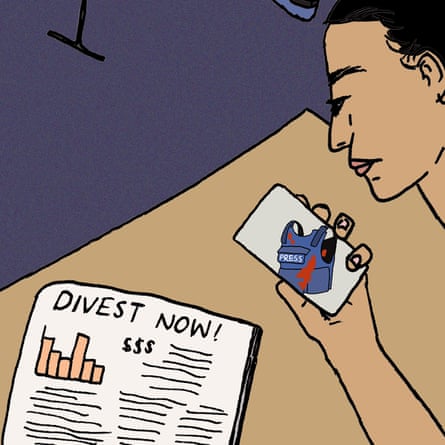
Because Muslims can be of any race and Palestinians are a multi-faith Arab society, with significant numbers of Christians, we can easily end up conflating histories and struggles when talking about Palestinians, Arabs and Islam. Until 1965, there weren’t many non-African American Muslims in the US. Most of the Arab immigrants were Christians. And immigration to the US from outside northern Europe had trickled to a near standstill. The reason was the Johnson-Reed Act, the 1924 immigration law that excluded Asians from immigrating to the country and introduced strict quotas for the rest of the world (2% of the number of foreign-born persons of any nationality residing in the US, according to the 1890 census). This law also deliberately sought to limit the numbers of Italian Catholics and eastern European Jews entering.
The numbers of Arabs immigrating to the US declined significantly over these years, though some continued to arrive via other paths. About 2,000 Palestinian families were admitted as refugees following passage of the Refugee Relief Act of 1953, and another 985 followed suit in the late 50s and early 60s. US policy at this point thought of Palestinians as a refugee problem, not as a people deserving self-determination. Meanwhile, Arabs were trying hard to settle here. The so-called racial prerequisite cases, which until 1952 basically allowed only white immigrants to naturalize as citizens, saw challenges from Arabs, who were seen by immigration courts as white (1909), then non-white (1914), then white (1915), then non-white (1942), then white (1944).
Much changed in the 1960s, including US immigration policy. In 1965, the US dropped the quota system in favor of skills-based immigration and family reunification. The original planners of the 1965 act believed family reunification would keep immigration from Europe flowing and thus keep the country white. As post-second world war Europe prospered, European immigration to the US declined, but immigration from the global south grew rapidly. This included increasing numbers from the Arab region. Many of them were students, both Muslim and Christian, and they began organizing for Palestine, especially after the 1967 war.
Decades of crackdowns
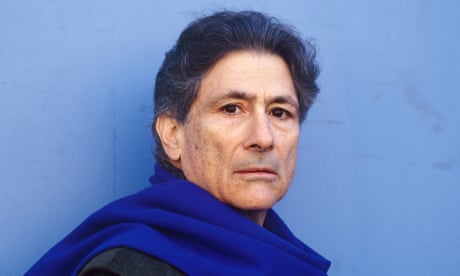
Edward Said seems like a prophet: 20 years on, ‘there’s hunger for his narrative’
After 1967, with the numbers of Arabs in the United States growing and with Arab activists now challenging the American consensus on the region, Arabs in the US captured the paranoid eyes of the federal government. (African American Muslims were already under surveillance, more out of the anti-Black beliefs held by the government than Islamophobia.) It is this history, of anti-Palestinianism after 1967, that is often overlooked.
Shortly after the 1967 Arab-Israeli war, Arabs and Arab Americans organizing for Palestine became subject to warrantless government surveillance. The Arabs being spied upon, however, didn’t know they were subject to surveillance until after 1972, the year the Lebanese American attorney (and legendary activist for Palestinian rights) Abdeen Jabara sued the federal government after suspecting he had been targeted. Jabara, who was then the president of the Association of American Arab University Graduates, discovered that the National Security Agency had been keeping tabs on his political activity since 1967, including the organizations he belonged to, his foreign and domestic travel, summaries of his public speeches, and more. The NSA had tapped his phone and transcribed more than 40 different conversations, including with his clients, and exchanged information about him with at least three foreign governments.
The FBI also included Arabs in America in Cointelpro, a now notorious FBI program that sought to destroy largely Black and leftwing organizations that the government considered subversive. And in 1972, the Nixon administration began “Operation Boulder”. The government proudly announced this program, which screened the visa status of anyone with an Arabic surname, and it led to harassment and intimidation of Arab communities around the USA. FBI agents would even leave their calling cards with the letters F-B-I written out in Arabic with Palestinians and other Arabs in the country.
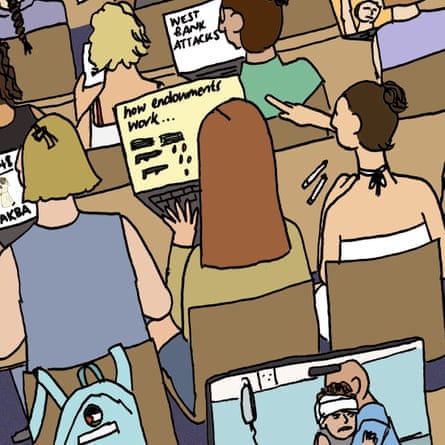
Over 150,000 people were put through Operation Boulder’s wringer. It wasn’t the only way the government sought to pressure Arabs in the country. In the middle of the Watergate scandal, the FBI also authorized an illegal burglary of the Arab Information Center in Dallas to gather information against Arab activists on Palestine in the US. All these efforts – the spying, persecution and coercion of a community for exercising its political opinions – never netted a single case of terrorism or espionage.
Various other forms of government repression against Arabs organizing for Palestine persisted throughout the late 60s onward, as did harassment and violence by private citizens and organizations. In 1969, the Anti-Defamation League (ADL) sent spies disguised as reporters to the annual convention of the Organization of Arab Students of the US and Canada, held at Ohio State University. Their report, which now sounds oddly contemporary, reads, in part:
The political activity of the Arab students in the United States will increase significantly in the coming school year. They are beginning to display a much greater understanding of how to present their arguments to the various levels of the American public (church groups, new left, lower middle class, etc); and any successes are certain to increase their confidence and, hence, their activity. The situation, however, is by no means hopeless if the proper action is taken immediately. One thing is certain, the threat on the campuses and in the churches can no longer be ignored but must be confronted directly. Otherwise, we will lose by default because the Arabs are making rapid gains in several areas.
The ADL continued spying on Palestine-solidarity and other leftwing organizations, as well as far-right groups, at least through the 1990s.
In 1985, a series of linked bombings targeted the American-Arab Anti-Discrimination Committee (ADC), which advocated prominently for Palestine. The organization’s Boston office was bombed, injuring two people, and later that year, Alex Odeh, the west coast director, was killed when a pipe bomb exploded as he opened the door to his office. Two suspects in Odeh’s assassination, associated with the Kahanist Jewish Defense League, fled to Israel, where they have since lived openly in West Bank settlements. One of them, Andy Green (who now goes by Baruch Ben-Yosef), has also been identified as a lead civilian organizer of recent protests blocking humanitarian aid shipments into Gaza.
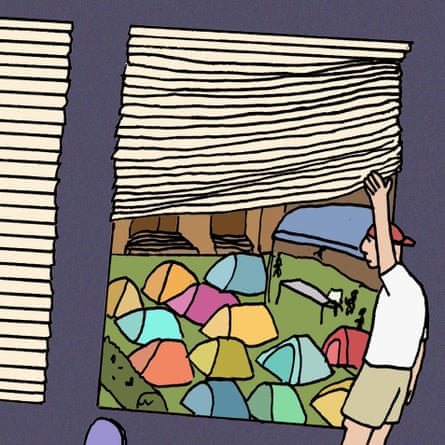
In 1987, seven Palestinians and one Kenyan were arrested in Los Angeles. The LA Eight, as they came to be known, were detained explicitly for their political opinions. The FBI had been spying on them for years, even renting an apartment next door to one couple and drilling a hole in their bedroom wall to peek in on their lives. As the group was distributing literature of the Marxist Popular Front for the Liberation of Palestine (PFLP), the government dusted off a McCarthy-era law to show that the LA Eight were guilty of promoting “the doctrines of World communism” and thus subject to deportation. The case would end only in 2007, when a federal judge dismissed all remaining charges and called the case “an embarrassment to the rule of law”.
While lawyers for the LA Eight were crafting their defense, someone leaked a document to them that showed how the Immigration and Naturalization Service (INS) had drawn up plans for large-scale registration and possible incarceration of up to 5,000 Arabs and Iranians in Oakdale, Louisiana, in the case of a terrorist attack on US soil or at the request of the executive branch. The document, titled Alien Terrorists and Undesirables: A Contingency Plan, revealed that the land was already prepared with water, sewer, gas and electric hook-ups, that tents and cots were ready, and that the local “community is receptive” to the prison camp. The congressman Norman Mineta, who at six years old had been forced into an incarceration camp as a Japanese American in 1942, was livid when he learned about the scheme, and he introduced it into the congressional record to expose the plan and make sure it was never implemented.
Almost no one talked about Muslim Americans before 9/11. Then everyone did
The contingency plan illustrated how surveillance had expanded beyond those involved in Palestinian advocacy, and American cultural suspicions followed suite. The oil embargo of 1973-74 and the Iranian hostage crisis of 1979-81 increased animosity against and stereotyping of Arabs, Iranians and Muslims in the country. “I don’t want the banks selling my country to the Arabs,” Howard Beale screams in the 1975 film Network. There were times when these federal programs of surveillance and repression of Arabs were reactions to brazen acts of terrorism, such as the Munich attack in 1972 by Palestinian militants. But these programs of state surveillance and repression were more often used to curtail the speech of Arab Americans and to cement US policy on the Israeli-Palestinian conflict.
Then came the September 11 attacks. After 9/11, everyone – immigrant and citizen, activist and spectator – became vulnerable. And a new category of suspicion fully entered the national imagination: the Muslim American.
The anti-Muslim focus of “war on terror” policies “was built on a pre-existing foundation of hostility to the Palestinian liberation movement”, as a recent report by the Center for Constitutional Rights and Palestine Legal explained.
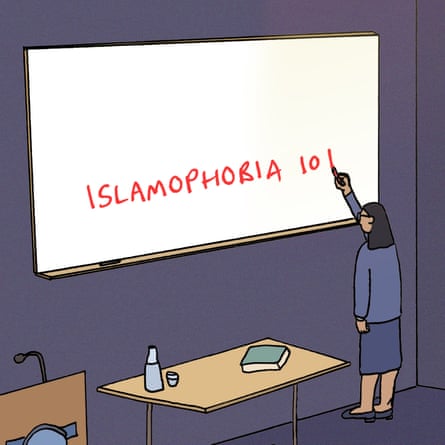 View image in fullscreen
View image in fullscreen
After September 11, existing programs that targeted Palestinians and Arabs were retooled and expanded, and the category of the Muslim American was made. In doing so, Muslim Americans were not just racialized after 9/11; they were basically invented. The term scarcely existed in the popular imagination before 2001. A Nexis database search of “Muslim American” in news sources from 1 January 1986 to 10 September 2001 finds a scant 437 mentions. Since September 11, there have been more than 10,000, the database’s upper limit.
In short, almost no one talked about Muslim Americans before 9/11. Then everyone did, all the way to Trump and his Muslim ban.
Why do we gloss over the root of the problem?
Islamophobia is unquestionably a major problem besetting the United States and beyond. It can often feel like Muslim lives have been so devalued that we barely register the almost 1 million people, mostly Muslims, who have been killed in direct violence in the US-led war on terror, let alone the 35,000 mostly Muslim Palestinians in Gaza. This disposability of Muslim lives illustrates the anti-Muslim racism behind much Islamophobia. In the United States, Muslims remain vulnerable to vigilante violence and their safety and wellbeing are still under threat, as is also true for Arabs and Palestinians.
But why are the anti-Palestinian origins of American Islamophobia glossed over? Could it be that, by thinking of Islamophobia primarily as a problem of religious acceptance, we shift the focus to religious tolerance, rather than reckoning with what the US might owe Palestine? There’s a long tradition of overcoming religious intolerance in this country, and this way Islamophobia becomes legible almost as the yin to antisemitism’s yang. Meanwhile, the hard work of reckoning with what the US might owe Palestine is deftly avoided. After all, it’s a lot easier to get your member of Congress to recognize the Muslim holiday of Eid al-Fitr than to recognize Palestine.
Significantly, the young Muslim Americans and Jewish Americans who are at the center of today’s protest movements are placing Palestinian rights back in the struggle to defeat Islamophobia. Why? Clearly not because of any scriptural kinship to Palestine, contemporary identity politics or antisemitism. The reason seems much more fundamental: freedom. These young people recognize that to free the US from its anti-Muslim and anti-Jewish prejudices requires freeing the Palestinian people from their oppression. This is not a position just for the moment – it’s a lesson about overcoming oppression worldwide.
Thu 23 May 2024
One evening last Thanksgiving weekend, three 20-year-old Palestinian college students were strolling around Burlington, Vermont, when they were suddenly gunned down by a stranger. One of the victims, Hisham Awartani, is now paralyzed from the waist down. Since they were wearing keffiyehs and speaking Arabic and English, speculation ran high that the young men had been victims of an Islamophobic attack.
The BBC noted that the attack “comes as the US deals with a surge in Islamophobia and antisemitism since the start of the Israel-Gaza war”. Vermont’s Middlebury College described the shooting as evidence of “a marked increase in Islamophobic acts on American campuses and beyond”. A White House statement mentioned how “far too many people live with the fear that they could be targeted and attacked based on their beliefs or who they are”.
But that’s not how Elizabeth Price, the mother of Awartani, seemed to understand the attack. She told WNYC radio that she had raised three children in the West Bank, where children routinely encounter Israeli state and settler violence, and she never believed Hisham would be targeted in the US. In the US, she said, she thought he “would be somewhere safe … I had not realized that to be Palestinian is to be unsafe and I understand that now, that you can’t, as a Palestinian, if you are proud and open as a Palestinian, protect yourself.” For Price, Hisham was a victim not primarily of Islamophobia but of anti-Palestinian violence.
One evening last Thanksgiving weekend, three 20-year-old Palestinian college students were strolling around Burlington, Vermont, when they were suddenly gunned down by a stranger. One of the victims, Hisham Awartani, is now paralyzed from the waist down. Since they were wearing keffiyehs and speaking Arabic and English, speculation ran high that the young men had been victims of an Islamophobic attack.
The BBC noted that the attack “comes as the US deals with a surge in Islamophobia and antisemitism since the start of the Israel-Gaza war”. Vermont’s Middlebury College described the shooting as evidence of “a marked increase in Islamophobic acts on American campuses and beyond”. A White House statement mentioned how “far too many people live with the fear that they could be targeted and attacked based on their beliefs or who they are”.
But that’s not how Elizabeth Price, the mother of Awartani, seemed to understand the attack. She told WNYC radio that she had raised three children in the West Bank, where children routinely encounter Israeli state and settler violence, and she never believed Hisham would be targeted in the US. In the US, she said, she thought he “would be somewhere safe … I had not realized that to be Palestinian is to be unsafe and I understand that now, that you can’t, as a Palestinian, if you are proud and open as a Palestinian, protect yourself.” For Price, Hisham was a victim not primarily of Islamophobia but of anti-Palestinian violence.

We hear a lot of talk these days about Islamophobia, anti-Arab racism, and anti-Palestinian bigotry, usually in that order. But which actually came first?
In the United States, Islamophobia is commonly seen as the motor that drives anti-Arab racism, a subset of which is anti-Palestinian bigotry. And yet, American history doesn’t quite abide by this order. In fact, it’s the opposite.
In US history, anti-Palestinian bigotry, expressed primarily through repressive practices of the US government, almost always came first. This anti-Palestinianism then manifested into a generalized anti-Arab racism, which only later – especially after 9/11 – morphed into the more widespread Islamophobia that we recognize today. Understanding this history can not only help explain the complex ways that both anti-Palestinianism and Islamophobia operate in the United States but can also point to what is missed when anti-Palestinian bigotry is subsumed into the frame of Islamophobia.
Conflated histories
Islamophobia, the fear and hatred of Islam and Muslims, is obviously not synonymous with Islam, which existed in the United States even before American independence. There is plenty of evidence that many of the enslaved Africans brought to colonial America and exploited for their labor were Muslim, even if communities of Muslims among them did not survive in any large-scale fashion. The peculiar institution of chattel slavery worked hard to stamp out any previous belief system and replace it with the slaveholder’s Christianity.
In the early decades of the 20th century, new religious movements among African Americans – such as the Moorish Science Temple and the Nation of Islam – bloomed, borrowing Islamic iconography and ideas to develop their own communities. Then, in 1964 and after splitting from the Nation of Islam, Malcolm X performed his hajj, the Muslim pilgrimage to Mecca, and became el-Hajj Malik el-Shabazz, arguably the world’s most famous American Sunni Muslim.
After 1967, Arabs in the US captured the paranoid eyes of the federal government
(It’s worth noting that Malcolm X used to use the analogy of the Jewish diaspora and the state of Israel as a model for cultivating pan-Africanism among African Americans. “We don’t want to move over here physically,” Malcolm wrote in an African magazine, as noted by Louis DeCaro, one of his biographers. “What we want is to have a cultural and psychological migration [to Africa], like the Jews have migrated to Israel philosophically and culturally.” But then Brother Malcolm toured the world, internationalizing the cause of equality for African Americans. One mostly forgotten leg of this 1964 tour was a brief stop Malcolm made in then Egyptian-controlled Gaza. After visiting the Khan Younis refugee camp in Gaza, Malcolm stopped using the Israel analogy and began employing the example of the Chinese diaspora instead.)

Because Muslims can be of any race and Palestinians are a multi-faith Arab society, with significant numbers of Christians, we can easily end up conflating histories and struggles when talking about Palestinians, Arabs and Islam. Until 1965, there weren’t many non-African American Muslims in the US. Most of the Arab immigrants were Christians. And immigration to the US from outside northern Europe had trickled to a near standstill. The reason was the Johnson-Reed Act, the 1924 immigration law that excluded Asians from immigrating to the country and introduced strict quotas for the rest of the world (2% of the number of foreign-born persons of any nationality residing in the US, according to the 1890 census). This law also deliberately sought to limit the numbers of Italian Catholics and eastern European Jews entering.
The numbers of Arabs immigrating to the US declined significantly over these years, though some continued to arrive via other paths. About 2,000 Palestinian families were admitted as refugees following passage of the Refugee Relief Act of 1953, and another 985 followed suit in the late 50s and early 60s. US policy at this point thought of Palestinians as a refugee problem, not as a people deserving self-determination. Meanwhile, Arabs were trying hard to settle here. The so-called racial prerequisite cases, which until 1952 basically allowed only white immigrants to naturalize as citizens, saw challenges from Arabs, who were seen by immigration courts as white (1909), then non-white (1914), then white (1915), then non-white (1942), then white (1944).
Much changed in the 1960s, including US immigration policy. In 1965, the US dropped the quota system in favor of skills-based immigration and family reunification. The original planners of the 1965 act believed family reunification would keep immigration from Europe flowing and thus keep the country white. As post-second world war Europe prospered, European immigration to the US declined, but immigration from the global south grew rapidly. This included increasing numbers from the Arab region. Many of them were students, both Muslim and Christian, and they began organizing for Palestine, especially after the 1967 war.
Decades of crackdowns

Edward Said seems like a prophet: 20 years on, ‘there’s hunger for his narrative’
After 1967, with the numbers of Arabs in the United States growing and with Arab activists now challenging the American consensus on the region, Arabs in the US captured the paranoid eyes of the federal government. (African American Muslims were already under surveillance, more out of the anti-Black beliefs held by the government than Islamophobia.) It is this history, of anti-Palestinianism after 1967, that is often overlooked.
Shortly after the 1967 Arab-Israeli war, Arabs and Arab Americans organizing for Palestine became subject to warrantless government surveillance. The Arabs being spied upon, however, didn’t know they were subject to surveillance until after 1972, the year the Lebanese American attorney (and legendary activist for Palestinian rights) Abdeen Jabara sued the federal government after suspecting he had been targeted. Jabara, who was then the president of the Association of American Arab University Graduates, discovered that the National Security Agency had been keeping tabs on his political activity since 1967, including the organizations he belonged to, his foreign and domestic travel, summaries of his public speeches, and more. The NSA had tapped his phone and transcribed more than 40 different conversations, including with his clients, and exchanged information about him with at least three foreign governments.
The FBI also included Arabs in America in Cointelpro, a now notorious FBI program that sought to destroy largely Black and leftwing organizations that the government considered subversive. And in 1972, the Nixon administration began “Operation Boulder”. The government proudly announced this program, which screened the visa status of anyone with an Arabic surname, and it led to harassment and intimidation of Arab communities around the USA. FBI agents would even leave their calling cards with the letters F-B-I written out in Arabic with Palestinians and other Arabs in the country.

Over 150,000 people were put through Operation Boulder’s wringer. It wasn’t the only way the government sought to pressure Arabs in the country. In the middle of the Watergate scandal, the FBI also authorized an illegal burglary of the Arab Information Center in Dallas to gather information against Arab activists on Palestine in the US. All these efforts – the spying, persecution and coercion of a community for exercising its political opinions – never netted a single case of terrorism or espionage.
Various other forms of government repression against Arabs organizing for Palestine persisted throughout the late 60s onward, as did harassment and violence by private citizens and organizations. In 1969, the Anti-Defamation League (ADL) sent spies disguised as reporters to the annual convention of the Organization of Arab Students of the US and Canada, held at Ohio State University. Their report, which now sounds oddly contemporary, reads, in part:
The political activity of the Arab students in the United States will increase significantly in the coming school year. They are beginning to display a much greater understanding of how to present their arguments to the various levels of the American public (church groups, new left, lower middle class, etc); and any successes are certain to increase their confidence and, hence, their activity. The situation, however, is by no means hopeless if the proper action is taken immediately. One thing is certain, the threat on the campuses and in the churches can no longer be ignored but must be confronted directly. Otherwise, we will lose by default because the Arabs are making rapid gains in several areas.
The ADL continued spying on Palestine-solidarity and other leftwing organizations, as well as far-right groups, at least through the 1990s.
In 1985, a series of linked bombings targeted the American-Arab Anti-Discrimination Committee (ADC), which advocated prominently for Palestine. The organization’s Boston office was bombed, injuring two people, and later that year, Alex Odeh, the west coast director, was killed when a pipe bomb exploded as he opened the door to his office. Two suspects in Odeh’s assassination, associated with the Kahanist Jewish Defense League, fled to Israel, where they have since lived openly in West Bank settlements. One of them, Andy Green (who now goes by Baruch Ben-Yosef), has also been identified as a lead civilian organizer of recent protests blocking humanitarian aid shipments into Gaza.

In 1987, seven Palestinians and one Kenyan were arrested in Los Angeles. The LA Eight, as they came to be known, were detained explicitly for their political opinions. The FBI had been spying on them for years, even renting an apartment next door to one couple and drilling a hole in their bedroom wall to peek in on their lives. As the group was distributing literature of the Marxist Popular Front for the Liberation of Palestine (PFLP), the government dusted off a McCarthy-era law to show that the LA Eight were guilty of promoting “the doctrines of World communism” and thus subject to deportation. The case would end only in 2007, when a federal judge dismissed all remaining charges and called the case “an embarrassment to the rule of law”.
While lawyers for the LA Eight were crafting their defense, someone leaked a document to them that showed how the Immigration and Naturalization Service (INS) had drawn up plans for large-scale registration and possible incarceration of up to 5,000 Arabs and Iranians in Oakdale, Louisiana, in the case of a terrorist attack on US soil or at the request of the executive branch. The document, titled Alien Terrorists and Undesirables: A Contingency Plan, revealed that the land was already prepared with water, sewer, gas and electric hook-ups, that tents and cots were ready, and that the local “community is receptive” to the prison camp. The congressman Norman Mineta, who at six years old had been forced into an incarceration camp as a Japanese American in 1942, was livid when he learned about the scheme, and he introduced it into the congressional record to expose the plan and make sure it was never implemented.
Almost no one talked about Muslim Americans before 9/11. Then everyone did
The contingency plan illustrated how surveillance had expanded beyond those involved in Palestinian advocacy, and American cultural suspicions followed suite. The oil embargo of 1973-74 and the Iranian hostage crisis of 1979-81 increased animosity against and stereotyping of Arabs, Iranians and Muslims in the country. “I don’t want the banks selling my country to the Arabs,” Howard Beale screams in the 1975 film Network. There were times when these federal programs of surveillance and repression of Arabs were reactions to brazen acts of terrorism, such as the Munich attack in 1972 by Palestinian militants. But these programs of state surveillance and repression were more often used to curtail the speech of Arab Americans and to cement US policy on the Israeli-Palestinian conflict.
Then came the September 11 attacks. After 9/11, everyone – immigrant and citizen, activist and spectator – became vulnerable. And a new category of suspicion fully entered the national imagination: the Muslim American.
The anti-Muslim focus of “war on terror” policies “was built on a pre-existing foundation of hostility to the Palestinian liberation movement”, as a recent report by the Center for Constitutional Rights and Palestine Legal explained.
 View image in fullscreen
View image in fullscreenAfter September 11, existing programs that targeted Palestinians and Arabs were retooled and expanded, and the category of the Muslim American was made. In doing so, Muslim Americans were not just racialized after 9/11; they were basically invented. The term scarcely existed in the popular imagination before 2001. A Nexis database search of “Muslim American” in news sources from 1 January 1986 to 10 September 2001 finds a scant 437 mentions. Since September 11, there have been more than 10,000, the database’s upper limit.
In short, almost no one talked about Muslim Americans before 9/11. Then everyone did, all the way to Trump and his Muslim ban.
Why do we gloss over the root of the problem?
Islamophobia is unquestionably a major problem besetting the United States and beyond. It can often feel like Muslim lives have been so devalued that we barely register the almost 1 million people, mostly Muslims, who have been killed in direct violence in the US-led war on terror, let alone the 35,000 mostly Muslim Palestinians in Gaza. This disposability of Muslim lives illustrates the anti-Muslim racism behind much Islamophobia. In the United States, Muslims remain vulnerable to vigilante violence and their safety and wellbeing are still under threat, as is also true for Arabs and Palestinians.
But why are the anti-Palestinian origins of American Islamophobia glossed over? Could it be that, by thinking of Islamophobia primarily as a problem of religious acceptance, we shift the focus to religious tolerance, rather than reckoning with what the US might owe Palestine? There’s a long tradition of overcoming religious intolerance in this country, and this way Islamophobia becomes legible almost as the yin to antisemitism’s yang. Meanwhile, the hard work of reckoning with what the US might owe Palestine is deftly avoided. After all, it’s a lot easier to get your member of Congress to recognize the Muslim holiday of Eid al-Fitr than to recognize Palestine.
Significantly, the young Muslim Americans and Jewish Americans who are at the center of today’s protest movements are placing Palestinian rights back in the struggle to defeat Islamophobia. Why? Clearly not because of any scriptural kinship to Palestine, contemporary identity politics or antisemitism. The reason seems much more fundamental: freedom. These young people recognize that to free the US from its anti-Muslim and anti-Jewish prejudices requires freeing the Palestinian people from their oppression. This is not a position just for the moment – it’s a lesson about overcoming oppression worldwide.


